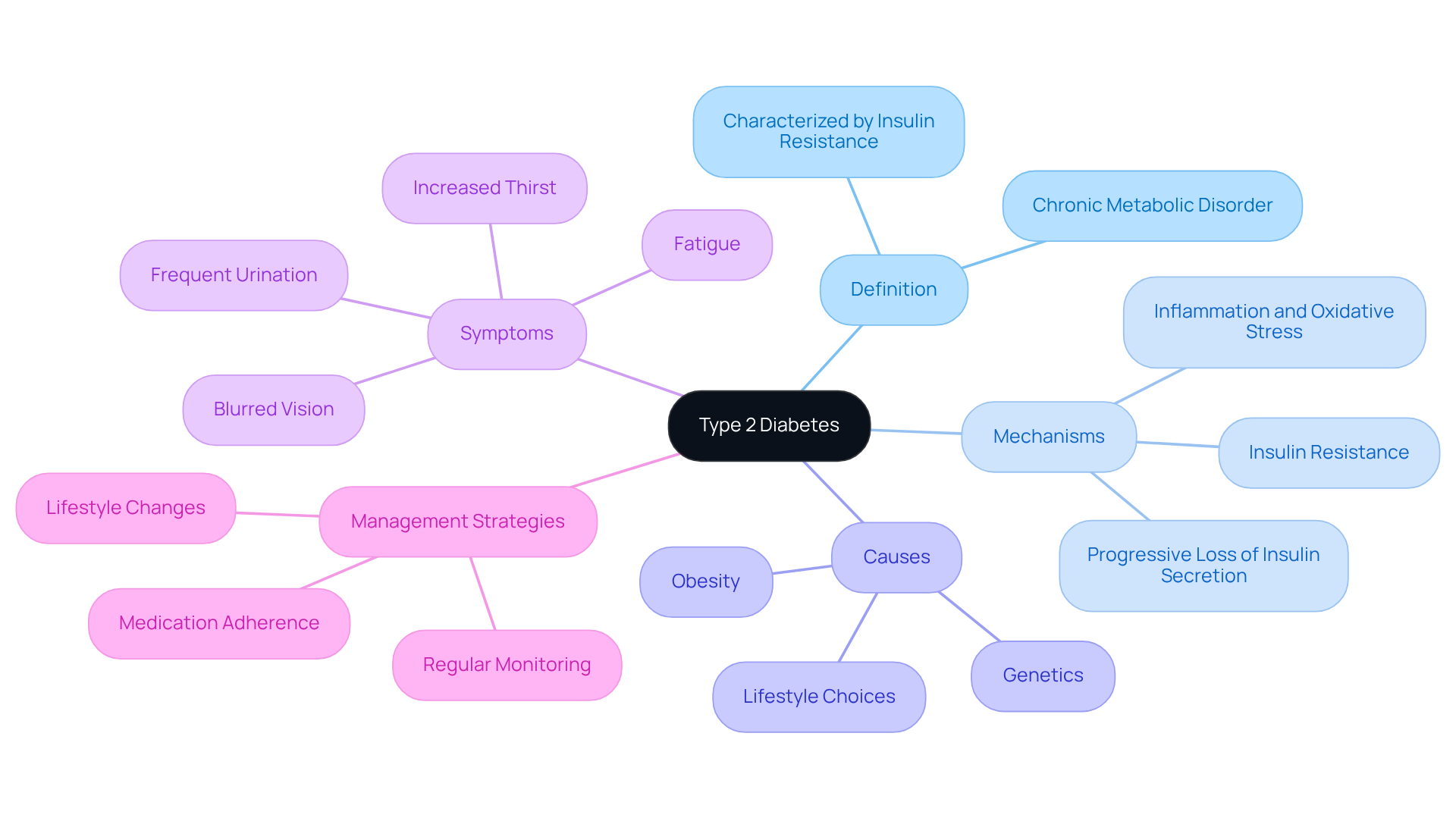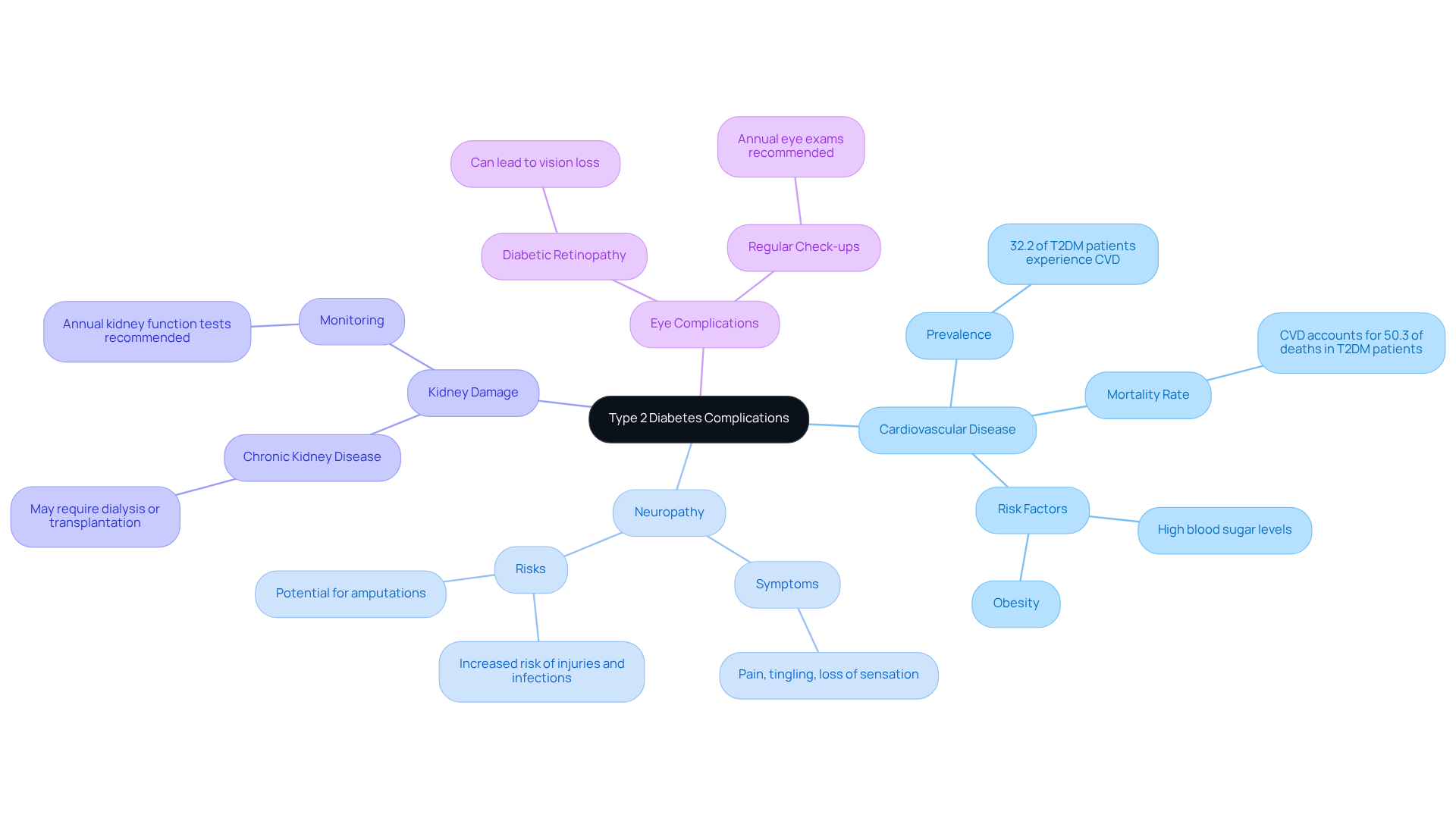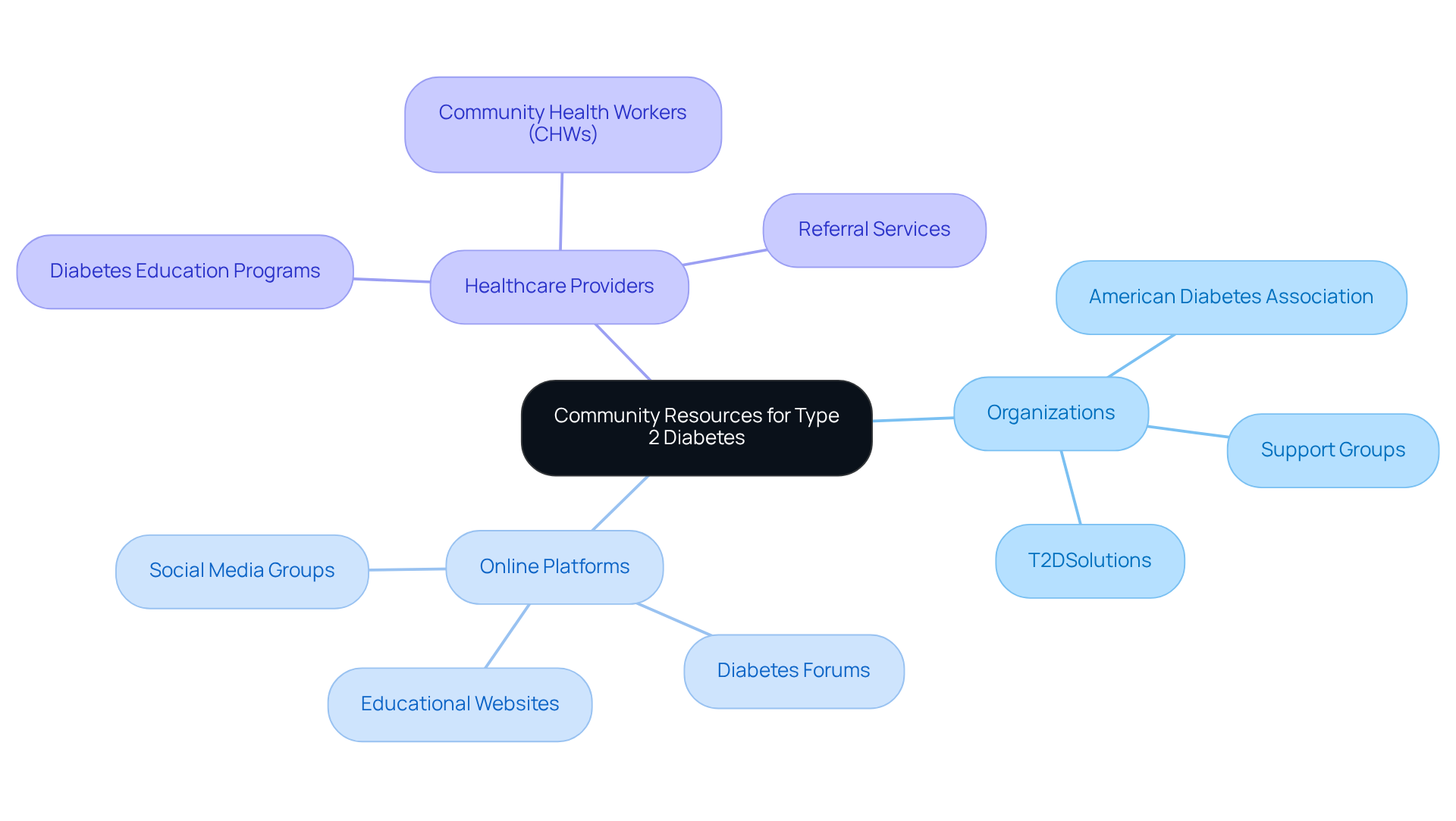Overview
Living with Type 2 diabetes can bring about serious complications, including:
- Cardiovascular disease
- Neuropathy
- Kidney damage
- Vision loss
These challenges can profoundly impact your quality of life and longevity. It's important to know that effective management is possible through lifestyle changes and regular medical check-ups. By taking these steps, you can significantly reduce these risks. In fact, studies show that unmanaged diabetes can lower life expectancy by as much as 10 years.
You're not alone in navigating this journey. Many have faced similar challenges and found ways to thrive. Remember, seeking support is a vital part of managing your health. We are here to support you every step of the way, encouraging you to reach out for resources and guidance that can make a difference in your life.
Introduction
Type 2 diabetes is more than just a medical condition; it represents a complex interplay of lifestyle choices, genetics, and the body's response to insulin. As this chronic illness progresses, it can lead to a myriad of complications that significantly impact a patient's quality of life, from cardiovascular issues to nerve damage. Understanding the full spectrum of consequences associated with type 2 diabetes is essential for effective management and prevention of serious health risks.
It's understandable to feel overwhelmed by this diagnosis. How can individuals navigate the challenges of this condition while accessing the support and resources necessary for a healthier future? You're not alone in this journey. We are here to support you every step of the way.
Define Type 2 Diabetes and Its Mechanisms
Type 2 diabetes, a long-lasting condition characterized by insulin resistance, has various consequences as the body's cells struggle to respond adequately to insulin. This can lead to higher blood sugar levels, a key factor in the consequences of type 2 diabetes. It's important to understand that this condition often develops gradually and can be influenced by factors such as genetics, lifestyle choices, and obesity, leading to potential consequences. Initially, the pancreas tries to compensate by producing more insulin, but over time, it may struggle to meet the body's demands.
Understanding these mechanisms is crucial. It helps patients recognize the importance of making lifestyle changes and adhering to medication to manage their condition effectively. You might notice symptoms such as:
- Increased thirst
- Frequent urination
- Fatigue
- Blurred vision
These symptoms are often the consequences of type 2 diabetes and develop slowly. Recognizing these symptoms early can lead to timely intervention and better management outcomes.
Remember, you're not alone in this journey. Many people are navigating similar challenges, and there are resources available to support you every step of the way. If you have concerns about your symptoms or management strategies, please reach out for support. Together, we can work towards a healthier future.

Explore Complications and Long-Term Effects of Type 2 Diabetes
Managing diabetes is crucial, as ignoring it can lead to the consequences of type 2 diabetes, which may result in serious complications if not addressed properly. It's understandable to feel overwhelmed by the potential risks, including the consequences of type 2 diabetes, which can lead to cardiovascular conditions such as heart attacks and strokes. These issues often arise from damage to blood vessels caused by high blood sugar levels. In fact, about 32.2% of individuals with Type 2 Diabetes Mellitus experience cardiovascular disease (CVD), which accounts for a staggering 50.3% of all fatalities in T2 patients. This statistic underscores the importance of vigilance in managing your health.
Another significant concern is neuropathy, or nerve damage, which can manifest as pain, tingling, or loss of sensation, particularly in the feet. This condition increases the risk of injuries and infections, potentially leading to severe outcomes, including amputations. You’re not alone in facing these challenges; many individuals share similar experiences and concerns.
Additionally, diabetes can harm your kidneys, potentially resulting in chronic kidney disease or kidney failure, which may require dialysis or transplantation. Eye complications, such as diabetic retinopathy, can lead to vision loss, making regular eye examinations essential. It’s crucial to stay proactive about your health.
Research suggests that unmanaged blood sugar levels can decrease life expectancy by up to 10 years, highlighting the serious long-term consequences of type 2 diabetes. Health professionals emphasize that maintaining blood sugar levels within a healthy range is vital to mitigate these risks. To support your journey, it’s recommended that individuals with diabetes visit their healthcare provider every three months. Regular check-ups, blood sugar monitoring, and adherence to treatment plans are essential strategies for managing this illness effectively and preserving your overall health.
Remember, you are not alone in this journey. There are resources and support systems available to help you every step of the way.

Engage with Community Resources and Support Networks
Connecting with community resources and support networks can provide invaluable assistance for individuals managing Type 2 diabetes. Organizations like the American Diabetes Association offer educational programs, support groups, and resources tailored to help you navigate this journey. Have you considered how online platforms and social media groups can create spaces for sharing experiences, seeking advice, and finding emotional support? Engaging with these communities can foster a sense of belonging and significantly reduce feelings of isolation.
It's understandable to feel overwhelmed, but remember that many healthcare providers are ready to help. They often provide referrals to diabetes education programs and support services. These resources empower you to take control of your health and improve your quality of life. You're not alone in this journey; there are people and resources ready to support you every step of the way.

Conclusion
Understanding the complexities of type 2 diabetes is essential for effectively managing this condition and its far-reaching consequences. It's understandable to feel overwhelmed by the information, but by grasping the underlying mechanisms, you can appreciate the importance of lifestyle modifications and adherence to treatment plans. Recognizing symptoms early can lead to timely interventions, ultimately improving health outcomes and your quality of life.
This article highlights several critical aspects, including the severe complications that may arise from unmanaged diabetes, such as:
- Cardiovascular disease
- Neuropathy
- Kidney damage
- Vision loss
The alarming statistics regarding these risks emphasize the necessity of regular monitoring and proactive health management. Remember, you are not alone in this journey; community resources and support networks provide vital emotional and educational support for individuals navigating the challenges of diabetes.
Ultimately, taking charge of your health journey is paramount. Engaging with healthcare providers, utilizing community resources, and connecting with support networks can significantly enhance the management of type 2 diabetes. Empowerment through knowledge and support fosters resilience and encourages you to pursue a healthier future. We are here to support you every step of the way, ensuring you feel connected and understood as you navigate this path.
Frequently Asked Questions
What is Type 2 diabetes?
Type 2 diabetes is a long-lasting condition characterized by insulin resistance, where the body's cells struggle to respond adequately to insulin, leading to higher blood sugar levels.
What factors contribute to the development of Type 2 diabetes?
The development of Type 2 diabetes can be influenced by genetics, lifestyle choices, and obesity.
How does the body respond to the demands of Type 2 diabetes initially?
Initially, the pancreas compensates for insulin resistance by producing more insulin, but over time it may struggle to meet the body's demands.
What are common symptoms of Type 2 diabetes?
Common symptoms include increased thirst, frequent urination, fatigue, and blurred vision.
How do symptoms of Type 2 diabetes develop?
The symptoms of Type 2 diabetes often develop slowly over time.
Why is it important to recognize symptoms early?
Recognizing symptoms early can lead to timely intervention and better management outcomes for the condition.
What should individuals do if they have concerns about their symptoms or management strategies?
Individuals should reach out for support if they have concerns about their symptoms or management strategies, as there are resources available to help.



